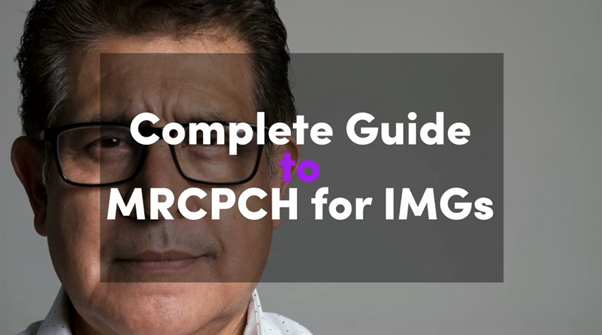MRCP Vs. PLAB - the Ultimate Guide for IMG Doctors
30 Sept, 202314 Minutes
If you want to move to the UK to work as a doctor in any areas of Medicine then there’s one thing you must do first – get GMC Registered. It’s a prerequisite and there are two route available. Either you sit PLAB or come through a Post Graduate Qualification route like MRCP. They’ll both get you where you need to be but the routes have a lot of differences that we’ll explain in this comprehensive guide.
Who are PLAB and MRCP aimed at?
As an international medical graduate looking to work in Medicine, you have the choice between pursuing PLAB and MRCP for GMC registration. Both are viable options, with the main difference between them being the types of jobs they lead to. PLAB will lead to junior positions, whereas taking MRCP allows you to start your NHS career at a more senior level working in a specialty like General or Acute Medicine.
PLAB is for any IMG that wants to start their UK career as a doctor as early as possible. It’s the Professional Linguistic and Assessments Board and it’s sole purpose is GMC registration – it’s not a postgraduate qualification in itself. The only thing that PLAB will help with is getting on the GMC register. However, it does have the advantage that it doesn’t take as long as MRCP to complete and that it costs less.
On the other hand, MRCP (Membership of the Royal College of Physicians) is a recognised postgraduate qualification that not only allows you to register with the General Medical Council but also showcases more skills and competencies than PLAB. You can start taking MRCP as soon as you have a year of experience post-graduation, using the skills and experience you acquire in your home country to gain this well-regarded qualification and gain entry into ST3+ level NHS jobs.
In essence, MRCP is for IMGs who want to start their NHS careers higher up the career ladder. It will take longer to complete but may be more desirable, depending on your career goals.
What Jobs do PLAB and MRCP Lead to?
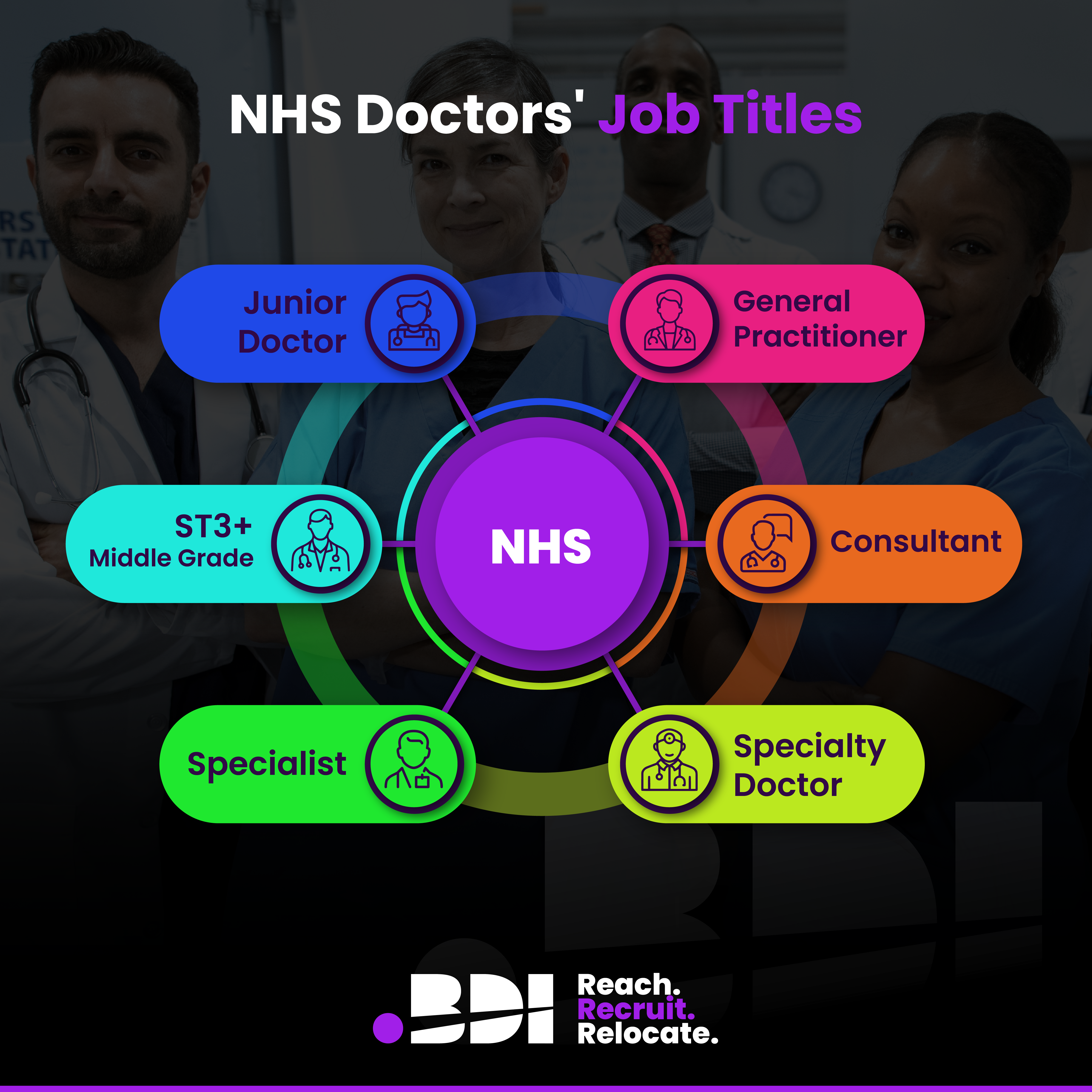
The NHS offers different types of jobs of varying grades. It includes foundation years (FY1-2), specialty training years (ST1+), and Consultant level. You can read more about where you might fit in to the system in our article about NHS Doctor Job Titles Explained.
Let’s start with PLAB. As mentioned, these examinations grant access to GMC registration. From there, you can begin applying for NHS jobs. The confusing part here is that there are tons of different NHS vacancies, and it can be difficult to know which ones you can apply for. With PLAB, you can access roles from NHS level FY2 up to ST3. You can expect to earn £32,398-£43,923 as a basic salary however you’ll receive a much greater amount in total since you also receive uplifts based on your hours of work and rota.
So, what about MRCP – what NHS jobs does this GMC recognised postgraduate qualification lead to? As a more specialised, in-depth qualification than PLAB, the completion of MRCP by an IMG leads to more senior roles. With MRCP, you can start your NHS career at ST3+ in roles such as Senior Clinical Fellow, Speciality Doctor or Specialist. It’s even possible to start as a Locum Consultant if you feel ready however many choose to drop back a step whilst they get used to working in a new healthcare system. The registrar scale starts at £55,329 and top end Consultants can earn up to £126,286 as a basic salary alone so you can see that holding MRCP is the key to high salary entry points.
How Long Do PLAB and MRCP Take?
Many IMGs are eager to begin their NHS career as soon as possible. Many of the most eager who are not long out of graduation choose PLAB for this very reason!
With PLAB, you only need to have a primary medical qualification in order to take it. However, that doesn’t mean you should sit the exam as soon as you’ve walked out of graduation! Generally, we recommend spending at least three months preparing for each of the PLAB exams, gaining at least one year of medical experience as you do so. By doing this, you will have more of a chance of passing. After all, passing PLAB means being at the same level as UK FY2 doctors, and that only happens with the correct amount of revision and preparation.
MRCP will inevitably take longer than PLAB to complete. It’s recommended that you begin the MRCP examinations one year after graduation – you will need this year of experience to sit the exam in the first place. For part 2 and PACES, you should have around two years of clinical experience.
We recommend spending between 12 to 24 months to prepare for part 1 and then another 12 months before sitting part 2 and PACES. In total, this will mean at least 36 months of prep. This should give you enough knowledge and overall experience to pass the examinations the first time.
You’ll need to weigh up how eager you are to get to the UK alongside your clinical background and experience to decide which route is better for you. PLAB might be quicker but remember that it will mean a lower starting point in terms of career level and potentially salary.
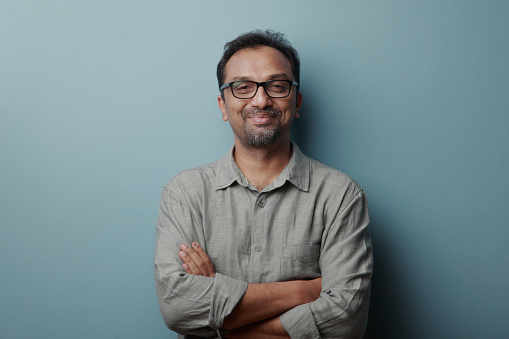
Which is more expensive – PLAB or MRCP?
Both PLAB and MRCP examinations will ask you to pay a fee. Assuming you’re booking the exams in 2023, for PLAB, you will pay:
- £255 for part 1
- £934 for part 2
- £1,189 in Total
The price of the PLAB exams increases annually, so don’t be surprised if you’re reading this beyond 2023 and notice that the cost of the exams has changed!
For MRCP, the costs differ depending on if you’re based internationally or in the UK. As an IMG, only the international costs will be relevant to you, so we will only list those here. It should also be noted that these costs are for the 2023 application period for exams that will be sat in 2024. There’s a chance that the price of the exams will differ if you’re applying beyond 2023.
- £616 for MRCP Part 1
- £616 for MRCP Part 2
- £1,202 for PACES
- £2,434 in Total
As we’ve learned so far MRCP will take a lot longer and will cost more than PLAB. You’ll need to spend more time training in your home country, pay more, and put in a lot more revision to complete the MRCP exams. Plus, while both are challenging exams, you may also find MRCP more difficult to pass, especially if you only put in the minimum amount of effort necessary. However, you should keep in mind that MRCP leads to more senior positions within the NHS. So, while it’s true that MRCP will cost you more money and take longer to complete, you will be kickstarting your NHS career further ahead than you would have done if you’d taken the PLAB route. For many IMGs, this fact alone makes MRCP more than worth it!
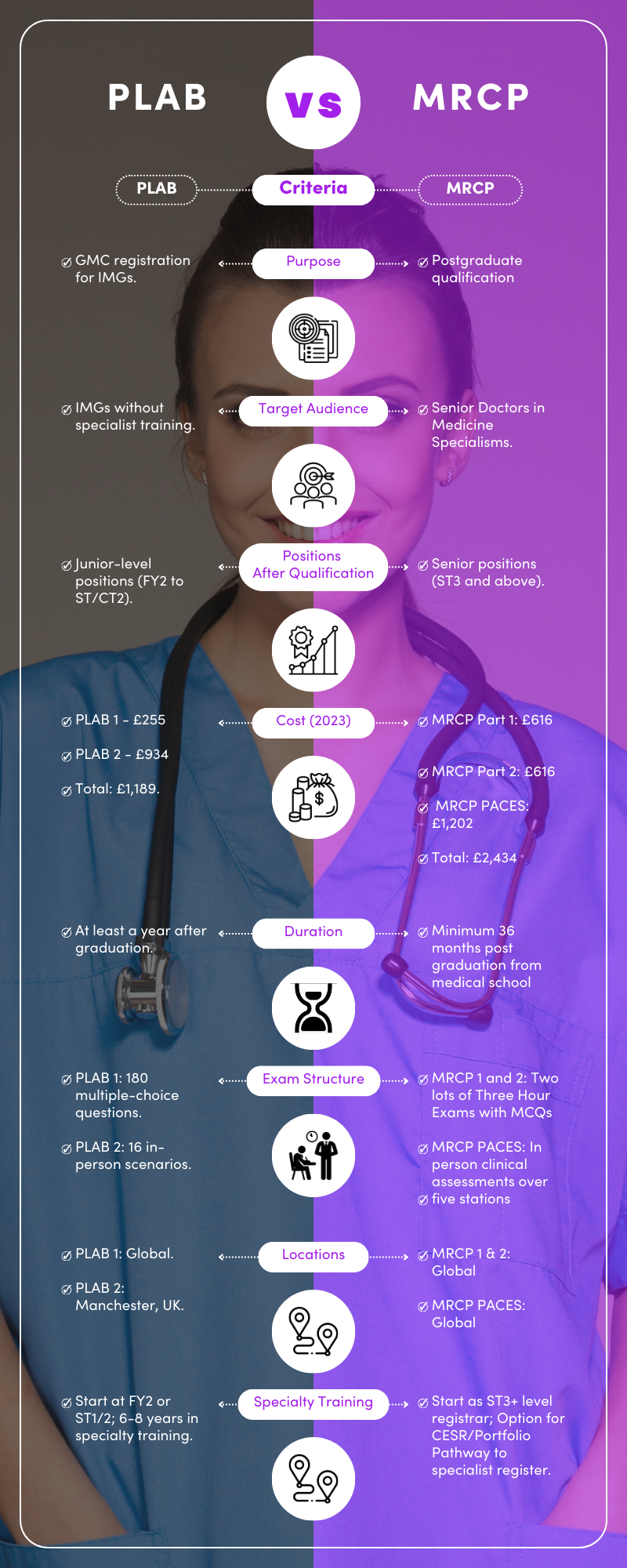
What to Expect from the Exams – PLAB vs MRCP
PLAB Exam Structure
PLAB comprises of two examinations to be taken on different dates: PLAB Part 1 and PLAB Part 2. You can only take part two once you have completed part one.
PLAB Part 1
PLAB part one is a single written paper with 180 multiple choice questions. You get a total of three hours to answer the questions. The questions offer a short scenario, and you get a total of five answers to choose from.
PLAB Part 2
PLAB 2 is an Objective Structured Clinical Examination (also known as OSCE). It’s a practical assessment that assesses your skills and knowledge in clinical situations that reflect real life, simulated in stations. There are eighteen stations in total that span a whole day, and you get eight minutes at each station. You’ll also get two rest stations in between.
You must take part two within two years of passing part one, so try not to put off applying for part two, or you might have to take the first part again!
MRCP Exam Structure
All parts of MRCP are rigorous and ask you to demonstrate your deep understanding of clinical practices. It will test your baseline clinical science knowledge while ensuring you can make sensible decisions, with each exam building on the knowledge you needed in the previous one. In terms of structure, here is what you can expect:
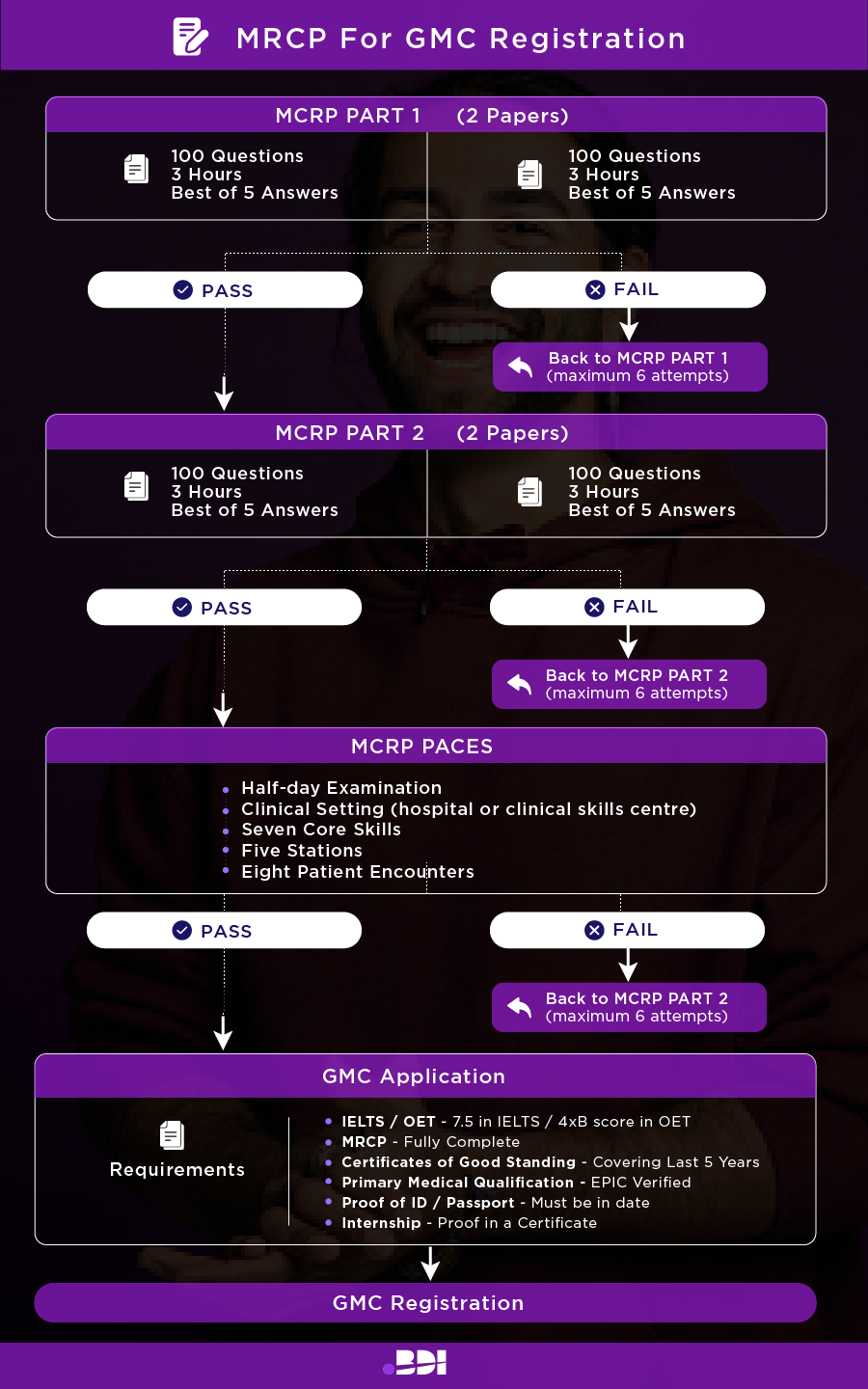
MRCP Part 1
MRCP includes two 3-hour papers that you take within a single day. They are both multiple-choice question papers, with 100 questions per paper (so you’ll answer a total of 200 questions in total). There are no images in this examination, and you can sit it online at a test centre.
MRCP Part 2
Part 2 asks you to complete two 3-hour papers within a single day. Like part one, these exams have 100 multiple-choice questions each. However, unlike part one, they do include images. You can take this test online internationally at one of the test centres.
PACES
Finally, there’s PACES: a practical assessment that assesses your clinical skills at five separate stations that take place over half a day. At each station, you will find a patient encounter, and you’ll have to perform as you could in a clinical environment while being assessed by two examiners. It assesses seven core skills and includes eight patients in total.
You can take PACES before taking MRCP part two – however, this is generally not recommended. PACES is quite difficult, so it’s a good idea to have as much training experience behind you as possible before completing it.
Where can I sit PLAB or MRCP?
PLAB Examination Locations
PLAB Part 1
UK Locations:
- Belfast
- Birmingham
- Cardiff
- Edinburgh
- London
- Manchester
- Newcastle
- Oxford
- Sheffield
Overseas Locations:
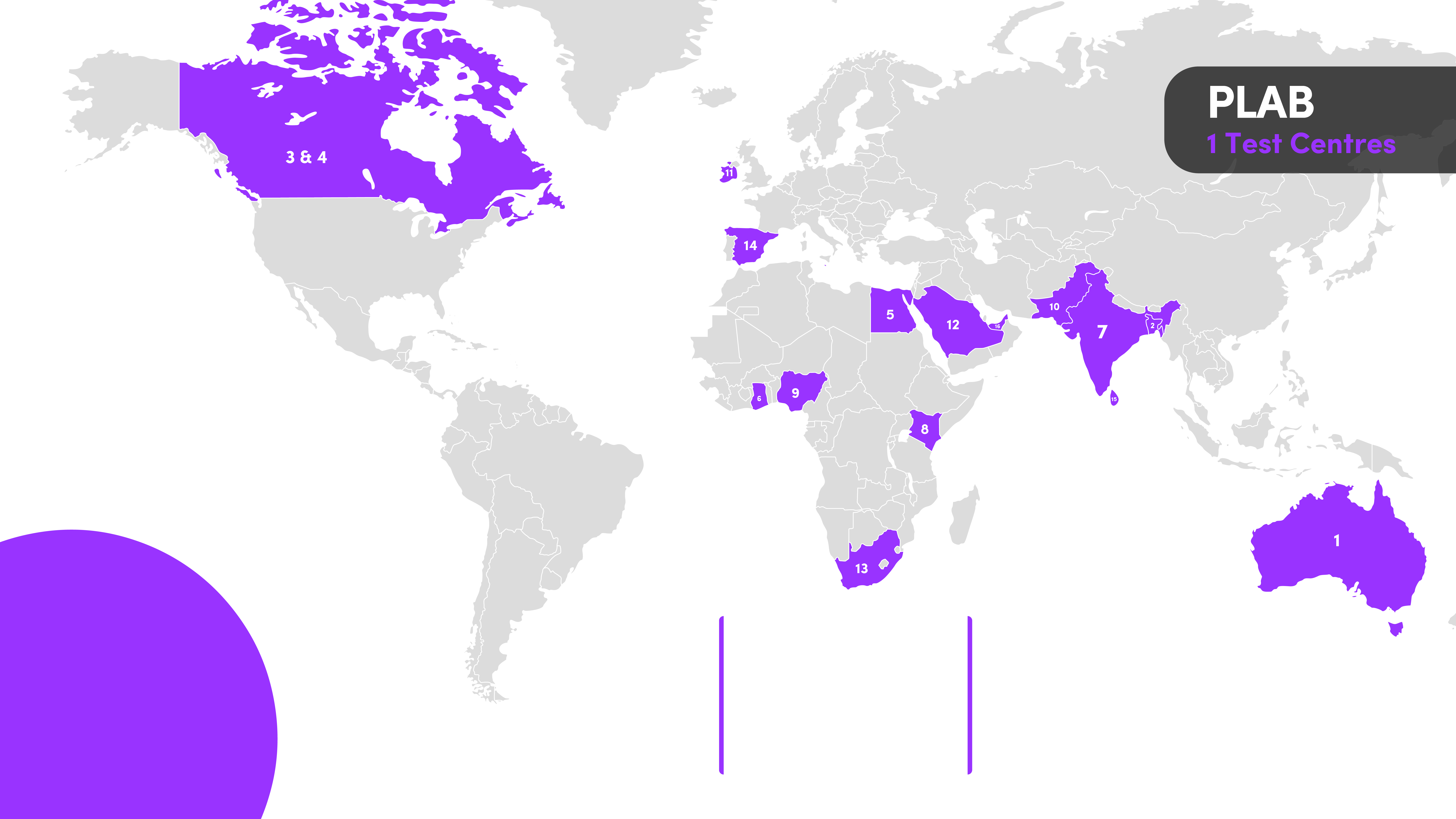
- Sydney, Australia
- Dhaka, Bangladesh
- Toronto, Canada
- Alexandria, Egypt
- Cairo, Egypt
- Accra, Ghana
- Bangalore, India
- Chennai, India
- Hyderabad, India
- Kolkata, India
- Mumbai, India
- New Delhi, India
- Nairobi, Kenya
- Abuja, Nigeria
- Enugu, Nigeria
- Lagos, Nigeria
- Islamabad, Pakistan
- Karachi, Pakistan
- Dublin, Republic of Ireland
- Riyadh, Saudi Arabia
- Johannesburg, South Africa
- Madrid, Spain
- Colombo, Sri Lanka
- Dubai, UAE
PLAB 2
For PLAB part 2, you will have to travel to the UK. There are only two test centres for PLAB part 2, and they both take place in Manchester (a northwest city in England). Manchester has an airport, but you can also fly to Heathrow and then travel via train to the city.
MRCP Examination Locations
Part 1 and 2
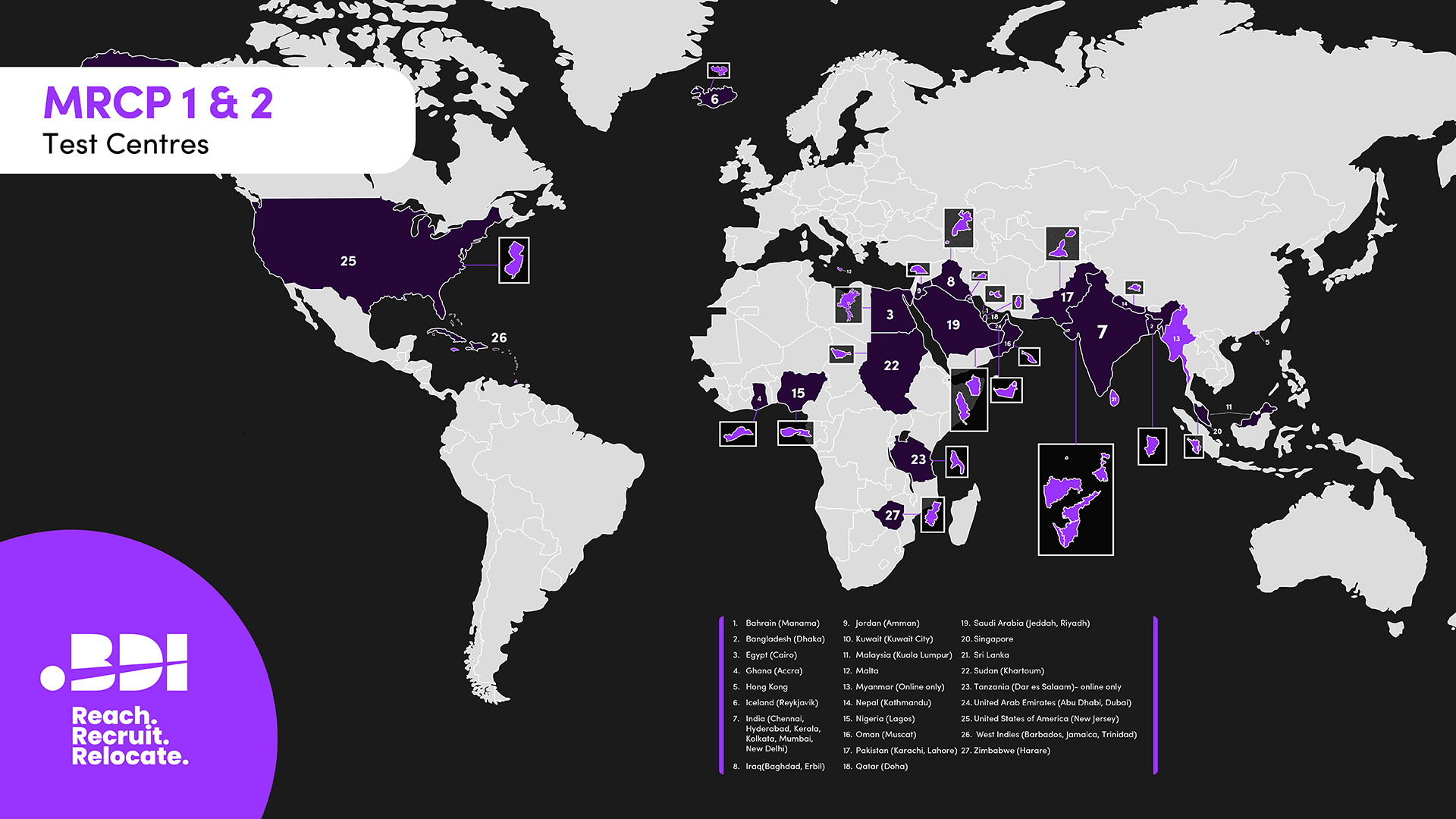
- UK
- Bahrain (Manama)
- Bangladesh (Dhaka)
- Egypt (Cairo)
- Ghana (Accra)
- Hong Kong
- Iceland (Reykjavik)
- India (Chennai)
- India (Hyderabad)
- India (Kerala)
- India (Kolkata)
- India (Mumbai)
- India (New Delhi)
- Iraq (Baghdad)
- Iraq (Erbil)
- Jordan (Amman)
- Kenya (Nairobi)
- Kuwait (Kuwait City)
- Malaysia (Kuala Lumpur)
- Malta
- Myanmar (Online only)
- Nepal (Kathmandu)
- Nigeria (Lagos)
- Oman (Muscat)
- Pakistan (Karachi)
- Pakistan (Lahore)
- Qatar (Doha)
- Saudi Arabia (Jeddah)
- Saudi Arabia (Riyadh)
- Singapore
- Sri Lanka
- Sudan (Khartoum)
- Tanzania - Online only
- United Arab Emirates (Abu Dhabi)
- United Arab Emirates (Dubai)
- United States of America (New Jersey)
- West Indies (Barbados)
- West Indies (Jamaica)
- West Indies (Trinidad)
- Zimbabwe (Harare)
PACES
MRCP(UK) is always trying to expand their test centres to meet international demand, so it’s worth checking their website in the future to see if a test centre has opened closer to you. Here is where you can take PACES currently (as of 2023):
- UK
- Egypt
- Hong Kong
- India (Bengaluru)
- India (Chennai)
- India (Hyderabad)
- India (Kochi)
- India (New Delhi)
- India (Puducherry)
- India (Pune)
- India (Thiruvananthapuram)
- Jamaica
- Jordan (Amman
- Kenya (Nairobi)
- Kuwait
- Malaysia (Kuala Lumpur)
- Malaysia (Penang)
- Malta
- Myanmar (Mandalay)
- Myanmar (Yangon UM1)
- Myanmar (Yangon UM2)
- Oman
- Pakistan
- Qatar
- Singapore
- Sri Lanka (Colombo)
- Sudan
- United Arab Emirates (Ajman)
- United Arab Emirates (Dubai)
- United Arab Emirates (Sharjah)
Specialty Training in the NHS with MRCP Vs. PLAB
With either PLAB or MRCP, you have the option of pursuing specialty training and becoming a Consultant in your chosen specialty. The real difference is how long it will take.
If you do PLAB to get GMC registered, you can start a junior role in a non-training position. It’s a great way to kickstart an NHS career; particularly for getting used to the NHS as a work environment while learning the ropes of the UK medical system. After completing the foundation years and either ST1+2/CT1+2, you can then begin ST3+ in a specialty, working your way through the training system before getting CCT and becoming a Consultant. This takes around eight years.
With MRCP, the route to getting on the specialist register is usually shorter. For one, you can start at level ST3+ after completing MRCP, which means applying to higher specialty training and essentially skipping those first couple of years. That’s not all – some doctors who take MRCP can even get on the specialist register straight away, assuming they have the necessary experience. They can do this through CESR/ Portfolio Pathway, which is an international equivalent to CCT. Using MRCP and a wealth of evidence, you can get CESR/Portfolio Pathway to gain specialist registration and become a Consultant as soon as you enter the UK.
For many IMGs (and UK doctors), being a Consultant is the ultimate goal – it’s a prestigious role and the NHS is has one of the most revered training systems in the world. As one doctor puts it:
“Consultants are the most senior grade of hospital doctors and are responsible for leading a team. Every patient who is admitted to hospital will have a named Consultant.” - Dr Paul Flynn, NHS Consultant.
Our step by step guide on how to get in to medicine training as an IMG is the perfect starting point for either PLAB or MRCP doctors aspiring to becoming a Consultant in the NHS.

Getting GMC Registered with PLAB or MRCP
In terms of GMC registration, PLAB and MRCP are worth exactly the same – they both grant access to the register, allowing you to practise medicine in the UK. As well as either PLAB or MRCP, you will also need the following for GMC registration:
- Passport
- PMQ
- Evidence of English Language Knowledge
- Proof of Internship/Training
- Fitness to Practise
- Certificate of Good Standing
If you’re interested in either route then some essential reading come in these two articles:
How to get GMC Registration via PLAB
In Summary
GMC registration is no simple process – it can take IMGs a long time to complete registration and become a UK doctor. On top of that, it can be hard to decide whether to take a junior-level examination like PLAB or a postgraduate qualification like MRCP. Both grant access to GMC registration but open the door to different types of jobs. Here are some of the key points to remember:
- MRCP and PLAB both lead to GMC registration.
- MRCP is a postgraduate qualification – PLAB is not.
- MRCP takes longer to complete and costs more than PLAB.
- MRCP leads to more senior NHS positions, resulting in more responsibility and higher pay.
The choice really is up to you – you should pick the route that aligns the most with your career goals. That might mean pursuing PLAB and getting GMC registered not long after graduating, or it may mean spending more time completing MRCP and beginning your NHS career in specialty training.
BDI Resourcing – Supporting MRCP and PLAB Doctors
At BDI Resourcing we are fortunate enough to have supported thousands of IMG Doctors throughout their careers. Our unique approach to international and domestic medical recruitment has lead us to hundreds of 5-star reviews and multiple awards. If you’re considering your next career move in the NHS then be sure to get in touch so that we can help with your applications, CV preparation, interview guidance and relocation.


